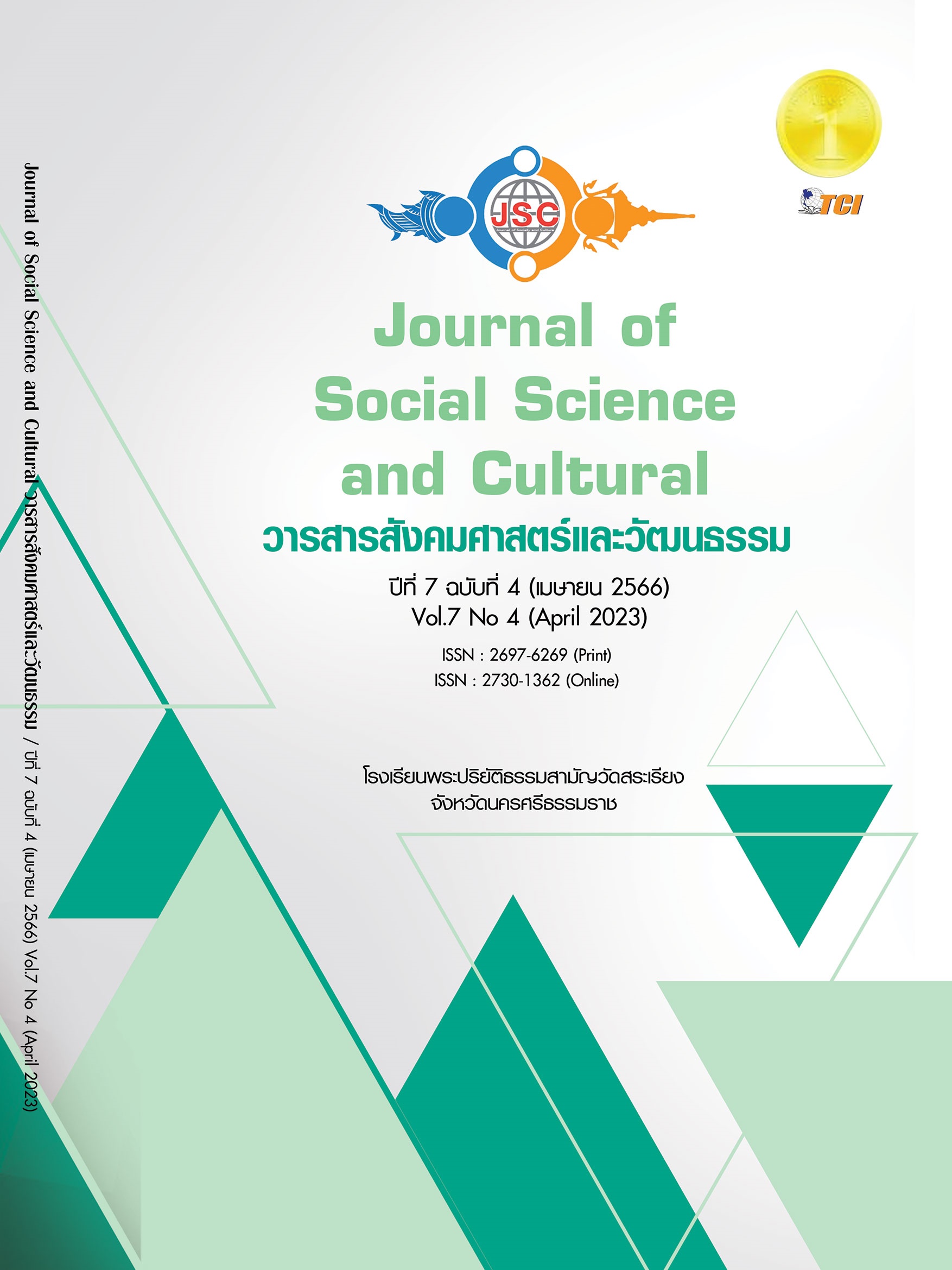DEVELOPMENT OF ASSESSMENT TOOLS ON COMPETENCES IN ORGANIZING SCIENCE EXPERIENCES FOR PRESCHOOL TEACHERS
Main Article Content
Abstract
This research article aimed to 1) study the components of competences in organizing science experiences for preschool teachers 2) create and examine the quality of the assessment tools on competences in organizing science experiences for preschool teachers. The research was carried out in 3 steps of research and development methodology which were step 1: developing the initial draft of components of the competences and assessment tools, step 2: quality examining by experts, and step 3: the pilot study. Participants consisted of 5 experts and 9 preschool teachers of schools under the Private Education Commission. The data were analyzed by content validity with IOC, reliability, and descriptive analysis. The research findings were 1. The components of competences in organizing science experiences consisted of 3 aspects, 9 indicators which were 1) designing of organizing science experiences had 3 indicators, 2) implementing of organizing science experiences had 3 indicators, and 3) evaluating of organizing science experiences had 3 indicators. 2. The set of assessment tools consisting of 2 parts: Part 1 the main tool was the competences in organizing science experiences assessment form, which was appropriate and practical (IOC = 1.00, ICC = .982), and Part 2 the tools used to collect data supporting the main tool consisted of 5 tools that were appropriate and practical, namely 1) classroom observation form (IOC = 1.00), 2) interview form (IOC = 1.00), 3) document study record form (IOC = 1.00), 4) teachers’ behavior and conversation record form (IOC = 1.00), and 5) self-efficacy in organizing science experiences assessment form (IOC = 0.90, α = .891).
Article Details
References
กัญจนวลัย นนทแก้ว แฟร์รี่ และจำเนียร จวงตระกูล. (2564). การจัดการข้อมูลในการวิจัยเชิงคุณภาพ. วารสารชุมชนวิจัย มหาวิทยาลัยราชภัฏนครราชสีมา, 15(2), 1-12.
กัญณัฏฐ์ สวัสดิ์สว่าง. (2558). เร่งพัฒนาครูปฐมวัย-ประถมประยุกต์สอนวิทย์แบบง่าย. เรียกใช้เมื่อ 23 เมษายน 2566 จาก https://mgronline.com/qol/detail/9580000045140
กุลิสรา จิตรชญาวนิช. (2562). การจัดการเรียนรู้. กรุงเทพมหานคร: สำนักพิมพ์แห่งจุฬาลงกรณ์มหาวิทยาลัย.
เกษศิรินทร์ ศรีสัมฤทธิ์. (2556). รูปแบบการพัฒนาวิชาชีพเพื่อเสริมสร้างสมรรถภาพครูด้านการจัดประสบการณ์ที่ส่งเสริมทักษะกระบวนการทางวิทยาศาสตร์และจิตวิทยาศาสตร์ของเด็กปฐมวัย. ใน ดุษฎีนิพนธ์ปรัชญาดุษฎีบัณฑิต สาขาวิชาหลักสูตรและการสอน. มหาวิทยาลัยศิลปากร.
จิตติรัตน์ แสงเลิศอุทัย. (2558). เครื่องมือที่ใช้ในการวิจัย. วารสารบัณฑิตศึกษา มหาวิทยาลัยราชภัฏสกลนคร, 12(58), 13-24.
ณัฏฐภรณ์ หลาวทอง. (2559). การสร้างเครื่องมือการวิจัยทางการศึกษา. กรุงเทพมหานคร: สำนักพิมพ์แห่งจุฬาลงกรณ์มหาวิทยาลัย.
ถาวร ทิศทองคำ. (2559). ขั้นตอนการสร้างเครื่องมือวิจัยที่มีคุณภาพ. เรียกใช้เมื่อ 23 เมษายน 2566 จาก https://www.thonburi-u.ac.th/km/6.pdf
ทิศนา แขมมณี. (2562). 10 สมรรถนะหลัก ปั้นเด็กไทยฉลาดรู้ อยู่ดีมีสุข มีความสามารถสูง และใส่ใจสังคม. เรียกใช้เมื่อ 23 เมษายน 2566 จาก https://www.thaiedreform.org/wp-content/uploads/2019/08/Core_competency_09.pdf
เทพกัญญา พรหมขัติแก้ว. (2552). 5 แนวทางสอนคิด เติม "วิทย์" ให้เด็กอนุบาล. เรียกใช้เมื่อ 23 เมษายน 2566 จาก https://www.moe.go.th/5-แนวทางสอนคิด-เติม-วิทย์
พิมพันธ์ เดชะคุปต์ และพเยาว์ ยินดีสุข. (2548). วิธีวิทยาการสอนวิทยาศาสตร์ทั่วไป. กรุงเทพมหานคร: สถาบันพัฒนาคุณภาพวิชาการ.
ยมนพร เอกปัชชา. (2557). การพัฒนารูปแบบการนิเทศแบบเสริมพลังเพื่อเสริมสร้างสมรรถนะการจัดประสบการณ์การเรียนรู้วิทยาศาสตร์ของครูปฐมวัย. ใน ดุษฎีนิพนธ์ครุศาสตรดุษฎีบัณฑิต สาขาวิชาการจัดการการศึกษาและการเรียนรู้. มหาวิทยาลัยราชภัฏนครสวรรค์.
สำนักงานคณะกรรมการการศึกษาขั้นพื้นฐาน. (2560). สพฐ.สัญจรขับเคลื่อนนโยบายสู่การปฏิบัติ. เรียกใช้เมื่อ 3 มีนาคม 2566 จาก https://drive.google.com/file/d/0B6NDSD_P _zqTLTZSckRzc3ZCXzg/view?resourcekey=0-Fx1xQQemJufwgqcUdUvQEw
สำนักงานคณะกรรมการการศึกษาขั้นพื้นฐาน. (2562). หลักสูตรพัฒนาศักยภาพศึกษานิเทศก์และครูผู้สอนในการสร้างเครื่องมือประเมินสมรรถนะผู้เรียนระดับการศึกษาขั้นพื้นฐาน. เรียกใช้เมื่อ 3 มีนาคม 2566 จาก http://reo9.obec.in.th/gis/eoffice/57000001tbl _datainformation/20190822161252onCCXj8.pdf
สำนักงานเลขาธิการสภาการศึกษา. (2551). รายงานการวิจัยสมรรถนะครูและแนวทางการพัฒนาครูในสังคมที่เปลี่ยนแปลง. กรุงเทพมหานคร: พริกหวานกราฟฟิค.
สำนักงานเลขาธิการสภาการศึกษา. (2562). รายงานผลการวิจัยและพัฒนากรอบสมรรถนะผู้เรียนระดับประถมศึกษาตอนต้นสำหรับหลักสูตรการศึกษาขั้นพื้นฐาน. กรุงเทพมหานคร: 21 เซ็นจูรี่.
Anders, Y. et al. (2018). Early Science Education – Goals and Process-Related Quality Criteria for Science Teaching. Germany: Verlag Barbara Budrich.
Bentzen, W. R. (2009). Seeing Young Children: A Guide to Observing and Recording Behavior. (6th edition). New York: Thomson Delmar Learning.
Briccia, V. & Carvalho, A. M. P. (2016). Teacher competencies and training for science education in the early years of elementary school. Revista Ensaio Belo Horizonte, 18(1), 1-22.
California Country Superintendents Educational Services Association Arts Initiative. (2014). What is a rubrics? Retrieved March 12, 2023, from https://ccsesaarts. org/wp-content/uploads/2014/11/Module11_ Handout_5-What-is-a-Rubric.pdf
Carlsen, W. (1991). Effects of new biology teachers’ subject-matter knowledge on curricular planning. Science Education, 75(6), 631-647.
European Commission. (2013). Supporting Teacher Competence Development for Better Learning Outcomes. Retrieved March 3, 2023, from http://ec.europa.eu/ education/policy/school/doc/teachercomp_en.pdf
Garbett, D. (2003). Science Education in Early Childhood Teacher Education: Putting Forward a Case to Enhance Student Teachers’ Confidence and Competence. Research in Science Education, 33(4), 467-481.
Studhalter, U. T. (2017). Teachers' Competence and Professional Development in Early Science Education. In Doctoral Thesis in Sciences. ETH Zurich university.
Tu, T. (2006). Preschool science environment: what is available in a preschool classroom? Early Childhood Education Journal, 33(4), 245-251.
Zimmermann, M. (2011). Naturwissenschaftliche Bildung im Kindergarten. Eine integrative Längsschnittstudie zur Kompetenzentwicklung von Erzieherinnen (A Longitudinal Study on the Development of Competence for Early Science Education). In H. Niedderer, H. Fischler, & E. Sumfleth (Eds.). Studien zum Physik- und Chemielernen. Band 128. Berlin: Logos.


